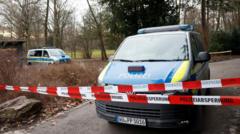Authorities in the German city of Aschaffenburg are grappling with the aftermath of a tragic knife attack that claimed two lives—a two-year-old boy and a 41-year-old man. The suspected attacker, a 28-year-old Afghan man, has been arrested. Local reports indicate that he had a troubling past involving violent behavior and mental health issues, and he was supposed to be deported after his asylum request was denied.
Witnesses described a chaotic scene in Schöntal Park, where the attack occurred around 11:45 AM. Officials confirmed that the assault targeted a kindergarten group, resulting in injuries to two others, including another child. Bavaria's interior minister, Joachim Herrmann, condemned the violent act while revealing unsettling details about the suspect's history, which raised questions about the management of asylum seekers.
In the wake of this tragedy, public officials, including Bavarian state premier Markus Söder and Chancellor Olaf Scholz, voiced their outrage. Söder labeled the act as “cowardly,” emphasizing that the man killed was a bystander who “paid for his civil courage with his own life.” Meanwhile, Scholz expressed frustration over the repeated violence and criticized the system that allowed the suspect to remain in Germany.
This incident has prompted renewed debates about immigration policies in Germany, particularly as the federal election approaches on February 23. In recent months, the country has seen a rise in violent attacks, leading to calls for stricter immigration controls and heightened public safety measures. As the nation mourns, the political landscape is shifting, with the anti-immigration party AfD gaining traction in the polls, highlighting the complex interplay between social issues, public safety, and governance.
Witnesses described a chaotic scene in Schöntal Park, where the attack occurred around 11:45 AM. Officials confirmed that the assault targeted a kindergarten group, resulting in injuries to two others, including another child. Bavaria's interior minister, Joachim Herrmann, condemned the violent act while revealing unsettling details about the suspect's history, which raised questions about the management of asylum seekers.
In the wake of this tragedy, public officials, including Bavarian state premier Markus Söder and Chancellor Olaf Scholz, voiced their outrage. Söder labeled the act as “cowardly,” emphasizing that the man killed was a bystander who “paid for his civil courage with his own life.” Meanwhile, Scholz expressed frustration over the repeated violence and criticized the system that allowed the suspect to remain in Germany.
This incident has prompted renewed debates about immigration policies in Germany, particularly as the federal election approaches on February 23. In recent months, the country has seen a rise in violent attacks, leading to calls for stricter immigration controls and heightened public safety measures. As the nation mourns, the political landscape is shifting, with the anti-immigration party AfD gaining traction in the polls, highlighting the complex interplay between social issues, public safety, and governance.





















